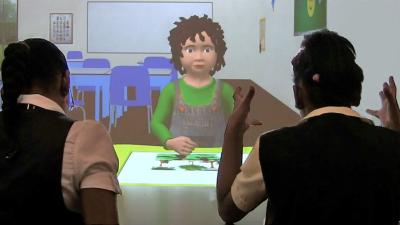The Future of Education: Virtual Peers

Carnegie Mellon University researchers have found a way to improve education for elementary and middle school students. The head of the project, Human-Computer Interaction Professor Justine Cassell, who is also associate dean for technology strategy and impact in the School of Computer Science, was recently featured in Business Insider for her work on artificially intelligent robots that talk with and teach young students. The bots, called "virtual peers," are life-sized online tutors that have shown success in helping students significantly raise their math, science and reading test scores. They also helped improve children's social and emotional skills, as the children held natural eye contact longer, improved their listening skills and understood when it was their turn to talk.
Cassell, along with her advisee, HCII doctoral student Samantha Finkelstein, also talked to the Huffington Post about the specifics of the project. Their main goal is to provide children with technologies that converse in their own native dialects in order to effectively teach them Standard English, while simultaneously preserving their native dialect. These virtual peers model good collaboration skills and help maintain a friendly and comfortable environment for maximum learning.
Cassell's team continues to test the bots in public and charter schools in Pittsburgh, and they hope to eventually extend the studies over the course of a school year.
"Sometimes we make the mistake that tech can only be used to teach STEM — but that's not the case," Cassell said. "It can also teach social and emotional skills to help us maintain those aspects of being human that we care about."
Read more about the virtual peers project in Business Insider and the Huffington Post.
Story by Aisha Rashid (DC 2019)

